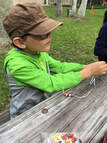|
Talking About
Florida Homeschooling... Evaluations and More |
A good evaluator works for the parents, assisting them in meeting legal requirements and in supporting them when districts overstep their bounds." |
|
Q: I've heard a lot about working with a child's interests, but I'm not sure that I agree. It sounds good, but my 10-year-old isn't interested in learning multiplication or division or higher level math. This sounds like I should quit pushing him to learn it. Or am I missing something? --- A: Working with a child's interests can mean spending time learning whatever the child is interested in. So, if he wants to know about sharks, spend time learning about sharks. But a parents' job, in my opinion, is to stretch the child's horizons and provide an education that will serve him well as an adult and help him function well in society, earn a living, make him less vulnerable to scams, etc. So if he wants to know about sharks, get books on sharks and work on both reading and science skills. Include some history and social studies with information about where sharks are found and how people have treated sharks. Include math as charts and graphs are studied or proportions are used to compare sharks in photos to real-life objects or people in the room. Don't just settle for learning exactly what the child is interested in; sneak in other learning, too. If it involves the child's interest, it will likely go over well.
But I've known people who stopped math at about third grade because the child wasn't interested in math. To me, this is a sad misunderstanding of how we should work with a child's interests. Instead of throwing in the towel because he's not interested, I recommend taking it as a challenge to get him interested. As a young homeschooled child, one of the things that sparked my interest in math was seeing its power. I watched as my dad daily, at noon, used his black triangular sextant to look at the horizon and then used the measurement on it, along with an old-fashioned slide rule and a fat book of trigonometric tables, to calculate where we were on the globe. Though we were surrounded on all sides by blue water, with no landmarks in sight, math enabled him to figure out our position. That was powerful! And it made me want to learn it. Perhaps you aren't circumnavigating the globe and using trigonometry in your daily life in that same way, but math is used on a regular basis by adults. It's a useful tool that helps people measure ingredients to bake cookies (or even to make double- or triple-size batches in one large bowl), make sure they have enough money to go on vacation, build shelves or other projects, etc. Figure out what you do (or could do) with math and do it around your child. Another way to build a child's interest is to do some projects or hands-on activities. Use building plans. Bake multiple batches of something. Help the child take on a small business and keep records of his expenses and income. Even take a word problem from a math book and act it out (and add as much drama as you can to spice it up). Find board games or card games or fun computer programs to make it seem like fun. There are trivial ways that may work better than expected. For example, do math problems with a paint brush and water on the sidewalk. Or with magnets on the refrigerator. Or with the answers written on a tic-tac-toe board. Or suddenly give a treat because of the math. Cheer like a cheerleader when the math is done right. Put stickers on papers. Proudly show the math to relatives and tell them how much he's learning. But another method of getting a child interested in learning more math is to step back and help him see why adults have been teaching math to children for thousands of years. (When I worked at the Field Museum of Natural History's library, the oldest item in the rare book collection was an ancient Egyptian papyrus with math homework on it.) Help him look at different careers and how math is involved in them. Help him understand that even with fancy computer programs, he'll need to have enough understanding of math to recognize if an answer makes no sense. Help him to see that without a knowledge of math, he'll be limiting his options in the future as many positions will require a knowledge of math. And then take it another step and make sure that he is ready for the math. If he's not ready, back up and re-learn the math needed to move on to the next level. Be encouraging, reassuring him that he'll get it eventually if he keeps working at it; let him take a break for a bit if needed, but then find a fun way to reintroduce it. So, should you give up on math with him? No. Though you might take a break for a few weeks--particularly if he's reached a point of total frustration. Then begin again with some fun method, with work that he can easily handle, cheer a lot, try to find some projects or games to use, let him see how it will be helpful in adult life, etc. If he's capable of learning, I'm convinced he'll eventually get it, but you might need to take time to help him get interested. The time and effort that takes will pay off greatly as his learning will increase so much once he's interested. Hope this helps, Cheryl [email protected]
0 Comments
Your comment will be posted after it is approved.
Leave a Reply. |
Archives
April 2024
Categories
All
|

 RSS Feed
RSS Feed






